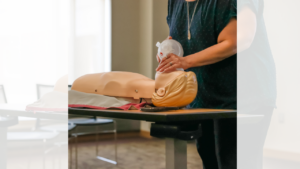Taking Charge of Your Colon Health
March is Colorectal Cancer Awareness Month, a time to shed light on a disease that, while serious, is often preventable. Dr. Richard Malyszek, affectionately known as Dr. Rick, is a general surgeon at CCMH. With a diverse background spanning from his roots in Scranton, Pennsylvania, to his service as a combat surgeon, Dr. Rick brings a wealth of experience to the topic.
Understanding Colorectal Cancer
Dr Rick emphasizes that colorectal cancer is a significant health concern with alarming statistics.
“In 2024 alone, there were approximately 106,000 new diagnoses and 46,000 deaths. However, unlike some other cancers, colorectal cancer is highly preventable, especially when detected early.”
While genetics play a role in a small percentage of cases, Dr. Rick points to lifestyle factors like diet and exercise as major contributors.
“Like most things in healthcare, one of the more controllable factors for disease and illness are the things we eat and the lifestyle we live. Most Americans are overweight, our diets are unbalanced, and in many instances, lacks sufficient fiber. Add to that the absence of exercise and you can see why the overall health of the average person could be improved rather easily.”
Symptoms of colorectal cancer can be subtle and easily overlooked.
“Waiting for symptoms of colorectal cancer to appear might mean the cancer is already advanced. Blood in the stool, changes in bowel habits, and unexplained anemia are red flags that should prompt immediate medical attention.”
The Power of Screening: Colonoscopy and Beyond
The gold standard for colorectal cancer screening is a colonoscopy. Dr. Rick explains that the recommended age for average-risk screenings has shifted to 45, due to an increase in cases among younger individuals.
“For those with a family history of polyps or colorectal cancer, screening should begin even at an even earlier age.”
Dr. Rick also addressed the at-home screening option.
“There are tests you can do at home that are very convenient. Yet, these tests are not as sensitive as a colonoscopy. At home screening tests might yield false positives. A positive at-home test will necessitate a follow-up colonoscopy, anyway. While a clear colonoscopy leads to 10-years of peace of mind, an at-home test will require screening every three years.”
Addressing Concerns and Risks
Many people are hesitant about colonoscopies due to perceived risks.
“Patients can be assured a colonoscopy is generally safe. Your chances of an adverse reaction or complication during a colonoscopy is less than driving across the country on a vacation. Anyone who needs or wants a colonoscopy is encouraged to seek out reliable information and weigh the risks against the benefits of early detection.”
Taking the Next Step
Dr. Rick’s key takeaway is that colorectal cancer screening is a vital part of health maintenance.
“I urge our patients to have an open and honest conversation with their primary care provider about their risk factors and to schedule screenings as recommended. It’s not as bad as the stories you might hear or what you might think. All of us need to prioritize our health and take proactive steps to prevent colorectal cancer.”
For those interested in learning more or scheduling a consultation, Dr. Rick can be contacted at the CCMH Medical Clinic at 265-2700. Remember, early detection saves lives, and taking charge of your colon health is an investment in your future.


